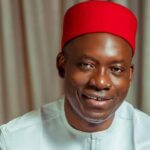By Chidi Anselm Odinkalu
Most people do not know or remember that, strictly speaking, there were and remain no official results for Nigeria’s 2007 presidential election. Organized by the Independent National Electoral Commission, (INEC), the vote itself occurred on 21 April 2007 under Maurice Iwu, a professor whose academic discipline coincidentally was alchemy. His main qualification for the position of Chairman of the INEC was that he was close to President Obasanjo’s fixer, Andy Uba.
The results began trickling in the following day. Under Nigeria’s Constitution, a winner of a presidential election must secure the highest number of votes in addition to winning a minimum of 25% of the votes in at least 24 of the thirty-six states of the federation. What this means is that it is impossible to declare a lawful result in a presidential election until the results in at least 24 states have been computed.
The recently departed legal scholar Professor Obi Nwabueze, SAN, recalls in his 2009 book on Judicialism and Good Governance in Africa, that two days after the vote, on 23 April 2007, INEC Chairman, Maurice Iwu “excusing himself from the collation of results exercise in which he and the party agents were engaged at the INEC headquarters, left the room and announced the Peoples’ Democratic Party (PDP) candidate the winner on the basis of results electronically transmitted to him from thirteen States while the results from 23 States were still being awaited.” Ondo was the thirteenth state whose result computation Iwu abandoned to announce the fictional outcome.
In announcing the results, Professor Iwu “neither gave the figure of the total votes cast nationwide nor the percentage scored by each of the candidates. There was also no state by state breakdown of the result announced.”
On the face of the record, the results declared by Maurice Iwu’s INEC failed to comply with the minimal requirements for certification of results in a presidential election. Even today, 17 years later, no one knows or can give the state-by-state breakdown of the results in the 2007 presidential election.
This was only one of the many problems with that vote, which occurred in the aftermath of the rejection by the National Assembly of President Obasanjo’s effort to grant himself a prohibited third presidential term. Following that event, Obasanjo appeared desperate to ensure that the election returned his hand-picked successor, Umaru Yar’Adua.
The ballot papers used in the election were not serialized, which made it impossible to control for ballot contamination. Following the vote, INEC indulged in what judges subsequently described as “abracadabra”, in many places producing entirely fictional results for what an election tribunal described as “elections that did not hold.”
This set the stage for the election petition by the leading opposition candidate in the 2007 election, Muhammadu Buhari of the All Nigerian Peoples’ Party (ANPP), against the man whom Maurice Iwu had announced as winner, Umaru Musa Yar’Adua. In his petition, Muhammadu Buhari asked the presidential election petition tribunal to find that the election and results announced by Maurice Iwu had failed to comply substantially with the constitution and the Electoral Act. Central to Buhari’s case was the absence of serialized ballot papers which, he argued, enabled ballot stuffing and ballot contamination on an unprecedented level.
According to section 146(1) of the Electoral Act of 2006, “an election shall not be liable to be invalidated by reason of non-compliance with the provisions of this Act if it appears to the Election Tribunal or court that the election was conducted substantially in accordance with the principles of this Act and that non-compliance did not affect substantially the result of the elections.” Having lost on a split decision at the election petition tribunal, Muhammadu Buhari’s appeal to the Supreme Court turned on the question of what “the principles of this Act” meant.
In deciding the controversial contest for the Anambra South senatorial district in 1983 between Chukwuemeka Odumegwu-Ojukwu v Dr. Edwin Onwudiwe, the Supreme Court had considered the meaning of a similar provision in the Electoral Act of 1983 and explained that “the essence of democratic elections is that they be free and fair and that in that atmosphere of freedom, fairness and impartiality, citizens will exercise their freedom of choice of who their representatives shall be by casting their votes in favour of those candidates who, in their deliberate judgment, they consider possess the qualities which mark them out as preferable candidates to those others who are contesting with them.”
In 2007, however, Justice Niki Tobi writing for the majority of the Supreme Court walked back these principles, complaining instead the notion of “principles” governing elections was “vague, nebulous and large” as well as confusing. Reducing the entire exercise to a farce, Justice Niki Tobi, himself a former law professor and dean of a leading law faculty, blamed his inability to offer clarity in the principles governing democratic elections on “my lack of adequate knowledge.”
Making no pretence to anchor its holding in the Electoral Act, the Supreme Court held that a petitioner in a Presidential election petition bears the burden to show “not only substantial non-compliance but also the figures, i.e. votes that the compliance (sic) attracted or omitted.” Put another way, the petitioner in an election petition has the burden of proving not just a negative but also of assigning a numerical value to its consequences.
On the question of non-serialization of ballot papers, therefore, the court disingenuously claimed that it had no proof that the non-serialization favoured one side or disfavoured the other.
A minority of the court, comprising George Oguntade, Aloma Mukhtar, and Walter Onnoghen, dissented, taking the view that “it is important that at the conclusion of an election, an unbiased observer should be able to see that the election was free, fair, transparent, and that no room had been left open for malpractices to occur. If deliberately or through inadvertence, those in charge of the elections had left room for anyone to doubt the integrity of the process in the election, then it is my view that the fundamental principles of the election have been compromised.”
In the end, however, the majority view prevailed and the Supreme Court validated the 2007 election structured to enable ballot stuffing and which announced a winner without a lawful result. The refusal of the Supreme Court to affirm any principles applicable to elections effectively reduced Nigeria’s elections to a demolition derby of illegality. In validating that result the way it did in 2008, the Supreme Court empowered judges to re-write election laws into meaningless pieces of artifice.
Invited shortly after the decision in this case of Buhari vs. Yar’Adua to deliver the distinguished lecture at the Nigerian Institute of Advanced Legal Studies (NIALS) in front of an audience including the then Chief Justice of Nigeria, Professor Obi Nwabueze SAN accused the Supreme Court of indulging in “perverse and narrow legalism” and of abdicating its responsibility of judicial decision making to a tyranny of “considerations of political expediency.”
This was a major landmark in the evolution of the supreme confusion that saddled the country with the judicial debacle in the most recent cases concerning Plateau and Kano States. The resort by the Supreme Court to keep publicly slapping down the Court of Appeal in these cases cannot be seen as progress as long as it fails to acknowledge its role in condemning Nigerians habitually since 2007 – in the words of Professor Nwabueze – “to be ruled by a government that has no claim to legitimacy.”
*A lawyer & a teacher, Odinkalu can be reached at chidi.odinkalu@tufts.edu



